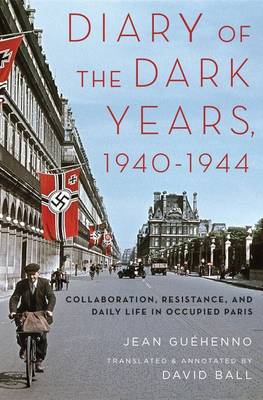3%OFF

Stock image for illustration purposes only - book cover, edition or condition may vary.
Diary of the Dark Years, 1940-1944: Collaboration, Resistance, and Daily Life in Occupied Paris
Jean-Marie Guehenno
€ 23.99
€ 23.22
FREE Delivery in Ireland
Description for Diary of the Dark Years, 1940-1944: Collaboration, Resistance, and Daily Life in Occupied Paris
Paperback. Diary of the Dark Years is a sharply observed record of day-to-day life in occupied Paris, but far more: it is "a remarkable essay on courage and cowardice" (Wall Street Journal), expressing both shame at French collaboration with the Nazis and the stubborn resistance of an intellectual under great pressure. Num Pages: 336 pages, 15 illus. BIC Classification: 1DDF; BGHA; HBJD; HBLW; HBWQ. Category: (G) General (US: Trade). Dimension: 159 x 235 x 24. Weight in Grams: 454.
Winner of the French-American Foundation Translation Prize for Nonfiction Jean Guehenno's Diary of the Dark Years, 1940-1945 is the most oft-quoted piece of testimony on life in occupied France. A sharply observed record of day-to-day life under Nazi rule in Paris and a bitter commentary on literary life in those years, it has also been called a remarkable essay on...
Read moreProduct Details
Publisher
Oxford University Press Inc
Format
Paperback
Publication date
2016
Condition
New
Weight
453g
Number of Pages
336
Place of Publication
New York, United States
ISBN
9780190495848
SKU
V9780190495848
Shipping Time
Usually ships in 15 to 20 working days
Ref
99-22
About Jean-Marie Guehenno
Jean Guehenno was a French writer and intellectual.; David Ball is Professor Emeritus of French and Comparative Literature, Smith College.
Reviews for Diary of the Dark Years, 1940-1944: Collaboration, Resistance, and Daily Life in Occupied Paris
[A] significant book, now made accessible to an anglophone audience in what is a powerful translation. ... [Diary of the Dark Years] is a rewarding work worth savouring slowly, as you dip into the life and mind of Jean Guehenno.
H-France
Ball's work...is exemplary. Ball does full justice to the powerful prose of Guehenno, a highly...
Read moreH-France
Ball's work...is exemplary. Ball does full justice to the powerful prose of Guehenno, a highly...
